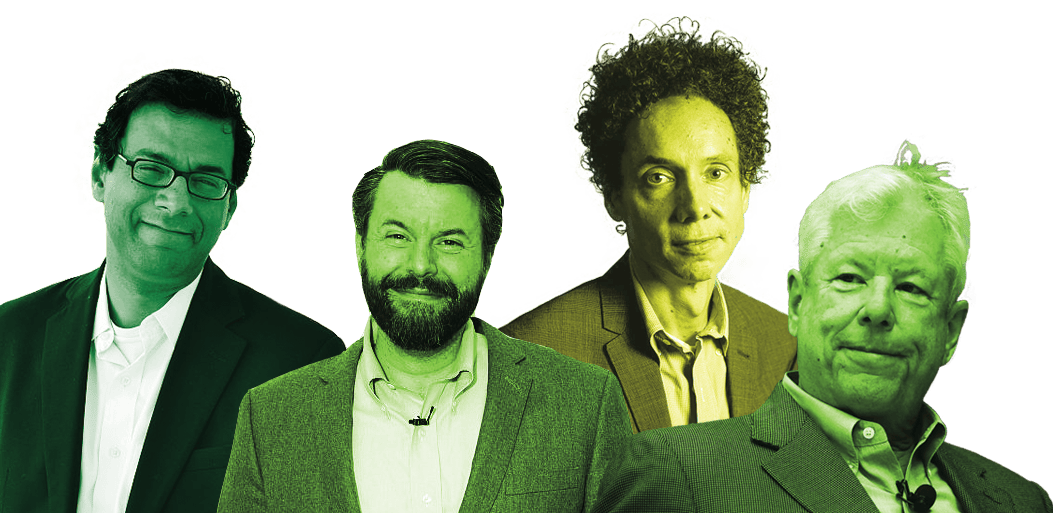One could argue that the key to success in any business is smart decision making. From advancing our careers to running a Fortune 500 firm, the choices we make along the way have life-altering impacts. It’s heavy stuff, and perfectly suited for Associate Professor of Operations, Information, and Decisions Katherine Milkman, who teaches Managerial Decision Making. Milkman sets two goals for her class: “First, to improve the students’ decisions so they can avoid common errors,” she says. “And second, to let them spot errors in the choices made by others.”
Since much of Milkman’s research utilizes big data to examine patterns in decision making, the course emphasizes how to evaluate those crunched numbers. She also stresses the importance of expanding one’s “toolbox for influencing behavior.” By learning why people make bad choices, we can better understand how to avoid those mistakes and implement effective solutions in the workplace. In essence, when you become a better manager, everyone around you improves. “One of the ways this can be most helpful is using insights to influence others for good,” Milkman says. Her recommended reads (and a podcast) from the course might be the difference between your next bad decision and a game changer.
Nudge: Improving Decisions About Health, Wealth, and Happiness
This essential book by Nobel Prize-winning economist Richard Thaler and law professor Cass R. Sunstein examines the choices we make and how to improve them. Among the subjects explored: how people find it twice as unpleasant to lose something as they find it pleasant to gain it, and the philosophy of “libertarian paternalism,” which encourages better choices (healthy lifestyle incentives at work, for example) without forcing anyone’s hand. Milkman gives Nudge the highest endorsement. “That book changed my life,” she says. “It gives students a new perspective. We haven’t just collected a laundry list of how people do things that are peculiar. This understanding of human nature becomes a set of tools to influence behavior for the better. It’s clear how this will be useful for the rest of their lives.”
“The Cancer Cluster Myth”
A New Yorker feature about cancer clusters by public health researcher Atul Gawande might seem like an odd reading assignment, but it fits well with the “Heuristics and Biases” class (which also includes a Malcolm Gladwell piece, “Connecting the Dots: The Paradoxes of Intelligence Reform”). Gawande’s story “is a great example of our misunderstanding of statistical distributions and how that can lead to witch hunts,” Milkman says. “It’s important that the readings not only be relevant and rigorous, but also entertaining.”
“Should We Really Behave Like Economists Say We Do?”
One man’s attempt to live his life like Homo economicus is the focus of this Freakonomics podcast. Says Milkman: “It points out the absurdity of the assumption that people are perfectly rational, optimizing decision-making machines as standard economic theory claims.” It also explains that behavioral economics is based on predictable ways in which we deviate from making optimal choices. “For instance, we have self control problems and care about other people—even strangers,” she says.
Influence: The Psychology of Persuasion
Milkman frames this tome by marketing and psychology professor Robert B. Cialdini to her students this way: “A book published in 1984 probably seems like it’s a thousand years old to you, but it’s a classic, and nothing rivals it when it comes to key concepts that psychologists have discovered in terms of influencing behavior. It really holds up to the test of time.” Cialdini’s research included years spent “embedded” with used-car dealers, fundraisers, waiters, and others whose jobs depend heavily on convincing people, and the resulting six key principles he outlines—including scarcity and social proof—are now standards.
“Group Process in the Challenger Launch Decision (A)”
This Harvard Business Review case study examines the Challenger space shuttle explosion and the team that went ahead with the takeoff despite objections and data indicating major concerns. Milkman’s students consider the details of the meeting at which the decision was made to go forward and pinpoint the failures of group processes that led to a fatal mistake in judgment.
The Power of Habit
“The Craving Brain,” chapter two of journalist Charles Duhigg’s book, dovetails neatly into Milkman’s own research into “temptation bundling” (combining a guilty pleasure, like reality TV, with something you should do, like exercise). Eventually a habit becomes an automatic routine and continues even if the reward goes away. The goal is to create lasting behavior change, something of value for both managers of employees and for individuals managing their lives.
Published as “Nudging Towards Success’” in the Spring/Summer 2018 issue of Wharton Magazine.

























